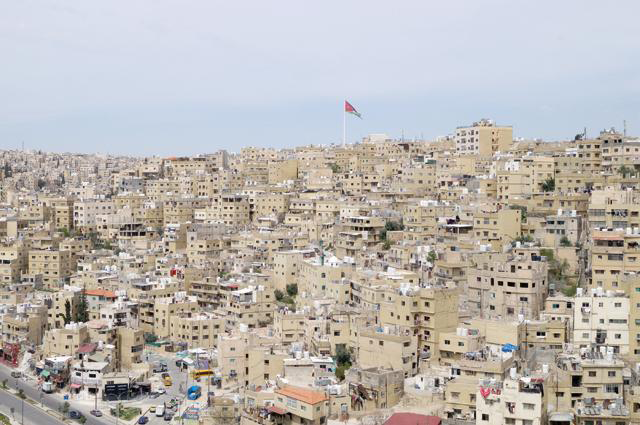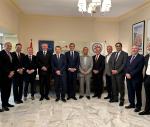You are here
CSS’ ‘Jordanian Street Pulse’ survey measures citizens’ views on domestic, regional issues
By Maria Weldali - Aug 18,2022 - Last updated at Aug 18,2022

Only one quarter of the Jordanian population believes that the Kingdom is moving in a positive direction, the Centre for Strategic Studies revealed in its recent survey (File photo)
AMMAN — Only one quarter of the Jordanian population believes that the Kingdom is moving in a positive direction, the Centre for Strategic Studies (CSS) revealed in its recent survey.
Announced by the CSS during a press conference at the centre’s headquarters at the University of Jordan on Wednesday, the survey comes as part of the Jordanian Index Poll Series, “Jordanian Street Pulse” that the centre conducts.
The series seeks to gauge public opinion and measure the population’s acquaintance with emerging domestic and regional issues, according to the CSS.
Speaking during the press briefing, CSS Director Zaid Eyadat said that Jordan’s previous experiences in political life still influence Jordanians’ opinions on the future of political party life in the Kingdom.
Eighty-four per cent of citizens believe that the practice of political parties in the past was not successful, he added.
The survey found that 87 per cent of Jordanians are not familiar with the new Political Parties’ Law, and only 13 per cent said that they have ever heard of it. The survey also noted that 94 per cent of Jordanians do not follow the activities of local political parties.
The survey further showed that only 2 per cent of Jordanians are actively considering joining a political party. Twenty two per cent of citizens believe that tribes are a crucial factor for the success of political parties in the Kingdom, while 30 per cent says that tribes will be a reason for the lack of success in politics, the CSS survey added.
Turning to current trends in the Kingdom, the survey said that increasing prices, high cost of living, deteriorating economic conditions, increasing unemployment rates and the government’s “confusion in decision-making”, are among the main reasons that led the majority of Jordanians to believe that things are heading in a negative direction.
Referencing the public sector modernisation roadmap, the survey noted that 81 per cent of citizens are not familiar with it, in contrast to the 18 per cent of Jordanians who said that they have heard of it.
It added that 42 per cent of those who are familiar with the government’s plan to modernise the public sector said that the government would fail to implement any changes. While 26 per cent believe that the government would implement a few items, only 17 per cent believe that the majority of the goals would be realised.
Only 6 per cent of Jordanians believe that the government will succeed in implementing all items aimed at modernising the public sector, according to the survey.
Regarding tourism in Jordan, the survey indicated that 65 per cent of Jordanians did not visit a single tourist location or hotel located in Jordan in the past three months.
Of the Jordanians who visited tourist facilities and hotels, 64 per cent of them said that the prices were too high when compared to the services provided, noted the survey.
The vast majority of Jordanians, at 95 per cent, do not think that the government’s economic policies and procedures aimed to reduce rising fuel prices were enough to improve their living conditions, it said.
Additionally, the survey added that 86 per cent of citizens have had to reduce household expenditures during the past year in order to contend with high prices, and 81 per cent of Jordanians have postponed the purchase of more expensive goods or services.
“Over half of the Jordanian population indicated that the government has done nothing to deal with price booms and inflation,” the survey showed.
The CSS survey also evaluated domestic and communal violence, indicating that the vast majority of Jordanians, representing 88 per cent of the country, believe that societal violence is prevalent in Jordanian society, while 12 per cent do not see violence as a major social trend.
Almost half of Jordanians believe that murder is among the most prominent forms of societal violence, followed by domestic violence, family and communal disputes, and theft, respectively, according to the survey.
“Forty-seven per cent of Jordanians believe that unemployment and poverty are among the main causes of societal violence in Jordan,” stated the survey.
Further, the survey showed that 63 per cent of Jordanians believe that social media platforms have dealt with cases of murder and violence in a “biased manner”. In contrast, 29 per cent think that social media platforms have acted with transparency and neutrality when covering such topics.
The survey also showed that 67 per cent of Jordanians are aware of US President Joe Biden's visit to the Middle East, and think that it “would lead to the normalisation of Israeli-Saudi relations.”
The report also focused on gauging public opinion regarding the Jeddah Summit for Security and Development, noting that the majority of Jordanians, representing 79 per cent of the country, have not heard of the summit.
Of the Jordanians who were familiar with the summit, 42 per cent believe that it could contribute to strengthening regional defence, intelligence and security cooperation, according to the CSS survey.
Related Articles
AMMAN — Only one quarter of the Jordanian population are optimistic about the current government, according to a survey conducted by the Cen
AMMAN — One-third of Jordanians think that the Kingdom is on the right track and 62 per cent think otherwise, a survey published on Monday s
More Jordanians believe matters in the country are going in the wrong direction than those who feel they are on the right track, according to a recent poll conducted by the International Republican Institute (IRI).

















